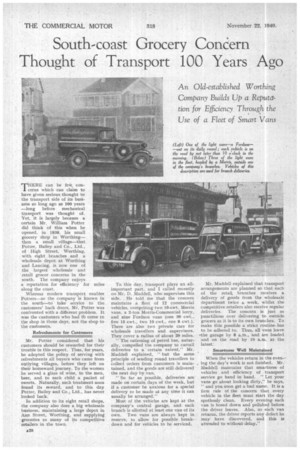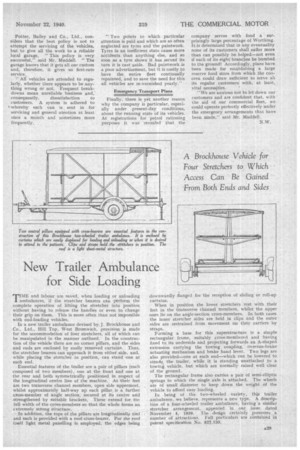South-coast Grocery Con6ern Thought of Transport 100 Years Ago
Page 30

Page 31

If you've noticed an error in this article please click here to report it so we can fix it.
An Old-established Worthing Company Builds up a Reputation for Efficiency Through the Use of a Fleet of Smart Vans THERE can be few. con
cerns which can claim to have given serious thought to the transport side of its business so long ago as 100 years —long before mechanical transport was thought of. Yet, it is largely because a certain Mr. William Potter did think of this when he opened, in 1838, his small grocery shop in Worthing— then a small village—that Potter, Bailey and Co., Ltd., of High Street, Worthing, with eight branches and a wholesale depot at Worthing and Lancing, is now one of the largest wholesale and retail grocer concerns in the south, The company enjoys a reputation for efficiency for miles along the coast.
Whereas modern transport enables Potters—as the company is known in the south—to take service to the customers' back doors, Mr. Potter was confronted with a different problem. It was the customers who had tb come to the shop in those days, not the shop to the customers.
Refreshments for Customers Mr. Potter considered that his customers should be rewarded for their trouble in this respect. Thus, for years, he adopted the policy of serving with refreshments all buyers who came from outlying villages, before they left on their homeward journey. To the women he served a glass of wine, to the men, beer, and to each child a packet of sweets. Naturally, such treatment soon found its Peward, and to this day Potter, Bailey and Co,, Ltd., has never looked back.
In addition to its eight retail shops, the company also does a big wholesale business, maintaining a large depot in Ann Street, Worthing, and supplying groceries to many of its competitive retailers in the town. To this day, transport plays an allimportant part, and I called recently on Mr. D. Muddell, who supervises this side. He told me that the concern maintains a fleet of 12 commercial vehicles, comprising two 10-cwt. Morris vans, a 2-ton Morris-Commercial lorry, and nine Fordson vans (one SO cwt., five 15 cwt., two 10 cwt., one 8 cwt.). There are also two private cars for wholesale travellers and supervisors. They cover a radius of about 20 miles.
" The rationing of petrol has, • naturally, compelled the company to curtail deliveries to a • certain extent," Mr. Muddeli explained, " but the same principle of sending round travellers to collect orders from customers is maintained, and the goods are still delivered the next day by van.
" So far as possible, deliveries are made on certain days of the week, but if a customer be anmious for a special delivery to be made at any time it can usually be arranged," Most of the vehicles are kept at the company's central garage, and each branch is allotted at least one van of its own. Two vans are always kept in reserve, to allow for possible breakdown and for vehicles to be serviced. Mr. Mudclell explained that transport arrangements are planned so that each of the retail branches receives a delivery of goods from the wholesale department twice a week, whilst the competitive retailers also receive regular deliveries. The concern is just as punctilious over delivering to outside grocers as it is to its own branches. To make this possible a strict routinehas to be adhered to. Thus, all vans leave -the garage by 8 a.m., and are loaded and oft the road by 10 a.m, at the latest.'
Smartness Well Maintained When the vehicles return in the even-, ing the day's work is not finished.Mr. Madden maintains that smartness of vehicles and efficiency of transport service go hand in hand. " Let your vans go about looking dirty," he says, " and you soon get a had name. It is a firm rule of the concern that every vehicle in the fleet must start the day spotlessly clean, Every evening each van is hosed down and polished before the driver leaves. Also, as each van returns, the driver reports any defect he may have discovered, and this is attended to without delay." . Potter, Bailey and Co., Ltd., considers that the best policy is not to attempt the servicing of the vehicles, but to give all the work to a reliable _local garage, " This policy is very successful," said Mr. Muddell. " The garage knows that it gets all our custom and, therefore, it gives us first-rate service.
" All vehicles are attended to regularly, whether there appears to be anything wrong or not. Frequent breakdowns mean unreliable business and, consequently, dissatisfaction to customers. A system is adhered to • whereby each van is sent in for servicing and general atention at least once a month and sometimes more frequently. " Two points to which particular attention is paid and which are so often neglected are tyres and the paintwork. Tyres in an inefficient state cause more accidents than anything else, and so soon as a tyre shows it has .served its turn it is cast aside. Bad paintwork is a poor advertisement, but it is costly to have the entire fleet continually repainted, and to save the need for this all vehicles are re-varnished yearly."
Emergency Transport Plans Finally, there is yet another reason why the company is particular, especially under present-day conditions, about the running state of its vehicles. At registrations for petrol rationing purposes it was revealed that the company serves with food a surprisingly large percentage of Worthing. It is determined that in any eventuality none of its customers shall suffer more than can possibly be helped—not even if each of its eight branches be bombed to the ground! Accordingly, plans have been made for establishing a large reserve food store from which the concern could draw sufficient to serve all its regular customers with, at least,. vital necessities. "We are anxious not to let down our customers and are confident that, with the aid of our commercial fleet, we could operate perfectly effectively under the emergency arrangements that have been made," said Mr. Muddell.




















































